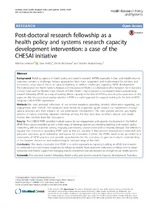Post-doctoral research fellowship as a health policy and systems research capacity development intervention: a case of the CHESAI initiative
Date
2016Author
Lembani, Martina
Teddy, Gina
Molosiwa, Dintle
Hwabamungu, Boroto
Metadata
Show full item recordAbstract
BACKGROUND: Building capacity in health policy and systems research (HPSR), especially in low- and middle-income
countries, remains a challenge. Various approaches have been suggested and implemented by scholars and
institutions using various forms of capacity building to address challenges regarding HPSR development.
The Collaboration for Health Systems Analysis and Innovation (CHESAI) – a collaborative effort between the Universities
of Cape Town and the Western Cape Schools of Public Health – has employed a non-research based post-doctoral
research fellowship (PDRF) as a way of building African capacity in the field of HPSR by recruiting four post-docs. In this
paper, we (the four post-docs) explore whether a PDRF is a useful approach for capacity building for the field of HPSR
using our CHESAI PDRF experiences.
METHODS: We used personal reflections of our written narratives providing detailed information regarding our
engagement with CHESAI. The narratives were based on a question guide around our experiences through
various activities and their impacts on our professional development. The data analysis process was highly
iterative in nature, involving repeated meetings among the four post-docs to reflect, discuss and create
themes that evolved from the discussions.
RESULTS: The CHESAI PDRF provided multiple spaces for our engagement and capacity development in the field of
HPSR. These spaces provided us with a wide range of learning experiences, including teaching and research, policy
networking, skills for academic writing, engaging practitioners, co-production and community dialogue. Our reflections
suggest that institutions providing PDRF such as this are valuable if they provide environments endowed with
adequate resources, good leadership and spaces for innovation. Further, the PDRFs need to be grounded in a
community of HPSR practice, and provide opportunities for the post-docs to gain an in-depth understanding
of the broader theoretical and methodological underpinnings of the field.
CONCLUSION: The study concludes that PDRF is a useful approach to capacity building in HPSR, but it needs
be embedded in a community of practice for fellows to benefit. More academic institutions in Africa need to adopt
innovative and flexible support for emerging leaders, researchers and practitioners to strengthen our health systems

